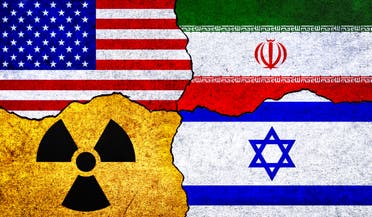Biden is tough with Russia.. and disagrees with Israel in the Middle East

The United States faces multiple security challenges in the Middle East, starting with the challenge of the Russian forces to the American forces in Syria, and passing through the activity of the Iranian nuclear program, and up to the threat of Iranian militias to the Americans.
It is noteworthy that the Americans’ reaction to these threats varies in intensity, and seems more stringent when it comes to Russia.
F-22 to deter the Russians
During the past weeks, the Russian forces deliberately violated the airspace over the Al-Tanf region, and the Americans were greatly disturbed by these arguments.
However, the Russian forces did not respond to the Americans when using the line of communication between the two parties.
And on June 14, the US Central Command announced that a squadron of F-22s had arrived in the region against the backdrop of Russian actions, “and to demonstrate the US capabilities to regroup forces and have a superior force ready immediately.”
message to the Russians
While a military source who spoke to Al-Arabiya.net and Al-Hadath.net explained, “The United States sent these forces to let the Russians understand that we will do everything to protect our soldiers from any threat.”
He stressed that the Americans mean what they say in this regard.
He also said that the F-22 squadron was ready for a confrontation with the Russian forces, “which have no chance because we are able to destroy them before the battle begins.”
This American talk suggests an uncharacteristic strictness towards the Russian forces, and it may also be unprecedented in its intensity and complications, which begin with the protection of American soldiers and end with the striking of Russian warplanes in the airspace of a third country.
Russian forces, Hmeimim base in Syria (AFP)
Soft tone
However, this American hardening towards the Russians is accompanied by an apparent softness in dealing with Iran.
It has become certain that President Joe Biden’s administration is using more than one channel of communication to negotiate with the Iranians to stop the nuclear program.
The Biden administration has confirmed more than once that it will do everything needed to prevent Tehran from obtaining a nuclear weapon. Spokesmen for the current administration said that “all options are on the table,” referring to the use of military force if necessary.
In addition, the Central Command has worked hard over the past two years to coordinate air defense in its region to confront the threats of Iranian missiles and drones.
Strategic aircraft such as the B-52 and B-21 also made sorties over the region and tested the integration of the huge capabilities of the American forces with the air forces of the countries of the region, including Israel.
As for now, all these measures and statements seem like offers, matched by the insistence on negotiating with Tehran and following the dialogue to reach a result.
Iranian militias
While the file of the spread of Iranian militias still raises a big question mark about the US position on Iranian armed influence in Iraq, Syria, Lebanon and even in Yemen.
The United States, since the return of the Democrats to power, has sought “calm” and has not tried to antagonize the militias, or to use military means to prevent their growth and spread.
Rather, it contented itself with emphasizing the sovereignty of states and the need for governments to control all of their lands.
And it imposed sanctions on some people working with these militias, and most of the penalties are related to the involvement of these people in an activity that the United States considers, from a legal point of view, to assist the Iranian nuclear program, or to finance a terrorist organization, and this is what we have seen repeatedly in the sanctions imposed by the United States on elements of Hezbollah and state militias in Iraq.
This scenario amounts to a repeat of what happened in late 2014 and 2015 when the United States, headed by Barack Obama, approved the nuclear agreement with Iran, whereby it put the reins on the nuclear project, Tehran received billions, and Washington turned a blind eye to the Iranian militias.

From Syria
Israeli dispute
On the other hand, the past months witnessed many American-Israeli meetings, and the United States reiterated its commitment to the security and safety of Israel, but the Israeli-American dispute over the issue of Iran and its militias seems wide.
The Israelis criticize the Biden administration, and say that its reliance on diplomacy puts it in a weak position in advance, just as “Iran does not respond to signals of deterrence, but rather the Iranians continue to expand and pursue the nuclear program, the missile program and the drones.”
The Israelis also consider that Iran was able to coexist with US sanctions, and took control of the internal situation during the unrest.
In addition, they believe that in the absence of the American military option, the Iranians will take whatever they want.
In particular, the Israelis raise the issue of Iran obtaining money in return for slowing down the nuclear program, not ending it, and they use this money to revive their economy, finance the capabilities of the Iranian Revolutionary Guard, and support their militias in the region.

militias
The past years witnessed massive Israeli attacks on Iranian sites, especially in Syria.
While the Americans maintain many military and reconnaissance capabilities in the region, the Israelis consider that they maintained a great deal of restraint during the Biden era, as they responded to the militias that attacked their positions with limited raids, without harming the Iranian Revolutionary Guards.
The Israelis have warned the Americans during the past months that these militias are an extension of Iranian influence, which is taking root day after day, and that Tel Aviv is working to strike Iranian weapons developed and deployed in Syrian territory, and is also trying to remove militia members from the borders of the Golan so that the Lebanese scenario does not repeat.
While all the statements issued by the two parties’ meetings, including the US National Security Adviser with his Israeli counterpart, indicate that the two parties seek to confront the pro-Iranian militias, the only practical steps to limit the entrenchment of these militias are still unilateral.
In the context, Jonathan Conricus, a former Israeli army spokesman and reserve officer, said, “The Israelis have warned the Americans that the presence of these militias will push the region in the next few months or years into great turmoil, which must be addressed now.”
So the Israelis summarize their position by saying, according to Conricus, “These militias will continue to expand until the US administration adopts the principle of punishing Iran for the actions of its militias.”
While the Americans sarcastically consider that the matter is not on the table, pointing out that the only party that talks about the use of military means is Israel!
xnxx,
xvideos,
porn,
porn,
xnxx,
Phim sex,
mp3 download,
sex 4K,
Straka Pga,
gay teen porn,
Hentai haven,
free Hentai,
xnxx,
xvideos,
porn,
porn,
xnxx,
Phim sex,
mp3 download,
sex 4K,
Straka Pga,
gay teen porn,
Hentai haven,
free Hentai,




